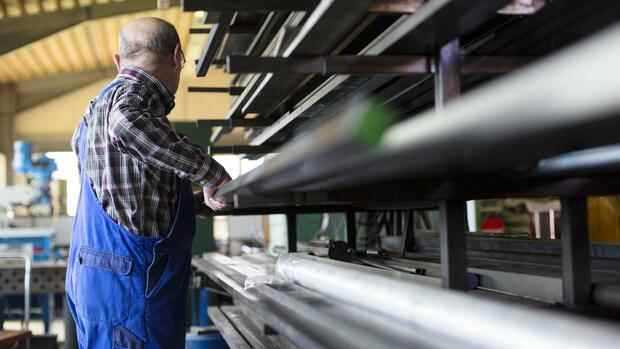Dusseldorf We are proud of Goethe, Schiller, Porsche, Mercedes and the family businesses!” With this sentence, Tom Rüsen, Fabian Kienbaum and Arndt Kirchhoff, together with the author Viktoria Steiner, want to achieve one thing above all: that family businesses are given the status as the core of the German economy they are entitled to.
As part of culture, society, success. Often emphasized in speeches, but important again in this context: German family businesses employ almost 60 percent of the workforce, account for more than 50 percent of the total turnover in Germany – and yes, they make up around 95 percent of all German companies.
And even if it only gets through between the lines in your book: This species is threatened – even though many of them have been farming for many generations. On average, family businesses are 108 years old. This means that the average has already survived two world wars.
This is important to mention when, after 77 years, there is war in Europe again. Germany owes a lot to industrial family businesses, but the authors find that they are not given enough credit. This also threatens the species. What is not in the collective memory cannot be important either.
Top jobs of the day
Find the best jobs now and
be notified by email.
With that, of course, they run into open doors with family entrepreneurs, but they don’t want to address them at all with their book. Rather, it is about raising awareness in the society of the country of poets and thinkers for family businesses, yes, and also being proud of them.
Medium-sized companies neglected
What is also admired abroad as “German Mittelstand” is often neglected in politics and the public. The authors recall, for example, how the then Economics Minister Peter Altmaier had just forgotten medium-sized family businesses in his industrial strategy.
Tom A. Rüsen, Fabian Kienbaum, Arndt G. Kirchhoff, Victoria Steiner: Managing grandchildren.
Hanser Verlag
Munich 2022
184 pages
20 Euros
And indeed, pupils, students and teachers could also understand the book well. It is aimed, says Tom Rüsen, Director at the Witten Institute for Family Businesses, at all those people who only know the evil patriarchs and useless heirs from crime novels or early evening series, or those who enjoy great conversation about family quarrels in entrepreneurial families. “Yes, and also gladly to the doctor in the Rotary Club, to works councils, new executives, politicians at home and in Berlin,” adds Rüsen.
It is true that there is a need to catch up everywhere in terms of understanding what makes German family businesses special and in order to better understand where they need to change course. With a very light pen, Viktoria Steiner has managed to write a book that can be read in two hours.
However, it will hardly make the connoisseur any smarter and, that is the problem of the book, it will possibly not reach all these important potential readers – from schoolgirls to doctors. They need it to be even simpler, more factual, even more entertaining, even shorter.
The authors have a lot to say about it. You analyze very aptly and in a way that is easy to understand from the inside and from a bird’s-eye view that if you want to understand how the German economy ticks, you have to know what family businesses are doing. And what they have so far (unfortunately) left.
Medium-sized companies are endangered by the Ukraine war. The high energy costs in particular are a problem for many.
(Photo: dpa)
Because even without Putin’s war of aggression in Ukraine, the authors knew from where the disruptions would continue to threaten even after a war: from families, through digitization, diversity and sustainability.
Moment! Doesn’t “business as grandchildable” also mean being sustainable? Yes and no. The book makes it clear that the family businesses have always had their own sustainability in mind, but not enough that of their surroundings.
It is also important to understand what differentiates German family businesses from those of other countries. They are larger in this country, more industrial, more international, and – you have to know that – many still produce in Germany, even if it would be cheaper elsewhere.
However, due to the now enormously increased energy prices, the family businesses are getting into big problems. They are anything but so-called capitalist pigs, they leave profits in the company in order to be able to act in times of crisis.
Especially now, in times of war, it will help them survive. As the Handelsblatt wrote a few weeks ago: The war is threatening Germany’s business model, ergo the business model of family businesses.
More about SMEs:
The author turned four zoom meetings with the three gentlemen into an easy-to-read book that begs for a sequel. After reading it, the benevolent reader interested in business has been confirmed, but has only become a little smarter. Nevertheless, the book makes you hungry for more – more depth, just as easy to read, but also more target group and more future.
It is the authors’ absolute credit to have caught the right moment when the family business species is really threatened and at the same time can prove that it is above all them that can deal with shortages, precisely because they react more slowly to trends, but very much react quickly to crises.
The inclined readers do not have to convince the authors of this, but everyone else.
More: “Germany will be the main loser” – This is how endangered the successful model of the German economy is
